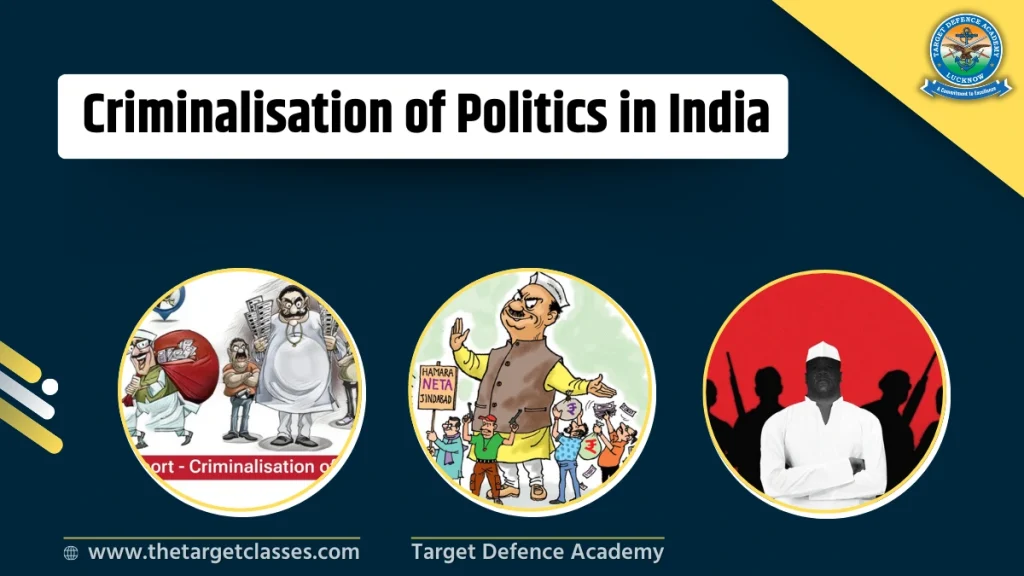Context
An analysis of MPs and MLAs across India shows that 31% of Members of Parliament (MPs) and 29% of Members of Legislative Assemblies (MLAs) have declared serious criminal charges against them.
Current Scenario of Criminalisation of Politics
(a) Criminalisation of politics refers to the rising participation of people with criminal backgrounds with grave criminal charges in electoral politics. It includes offences where the maximum punishment is five years or more, and that too non-bailable.
(b) In the Lok Sabha, the number of elected representatives having serious criminal cases has more than doubled. For eg, 14% in 2009 to 31% in 2024.
(c) In the legislative Assemblies, it was twenty-nine percent last year, which is 1,200 members of the legislative assembly. Telangana tops the list with 71% MPs, followed by Bihar (48%).
(d) Andhra Pradesh tops the list when it comes to MLAs with serious criminal cases (56%). Also, the second is Telangana (50%).

Reasons for Criminalisation of Politics
(i) Loopholes in disqualification Laws: The Representation of the People Act, 1951 (RPA) disqualifies candidates only after conviction. As we know that trials take time, so the accused get enough time to contest elections before the judgment.
(ii) Money and Muscle Power: Criminals with huge fiscal resources and local influence are seen as “winnable” candidates.
(iii) Low Voter Awareness: Affidavits clearly show candidate details, but many voters don’t give much attention to them. More often, they only vote based on caste, religion, etc.
(iv) Party Complicity: Parties most of the time validate fielding accused candidates by citing “popularity” and “electoral chances.”
(v) Judicial Delays: Frequent adjournments and politically motivated withdrawal of cases allow criminals to escape conviction.
(vi) Nexus Between Politicians, Bureaucrats, and Criminals: Vohra Committee Report (1993) warned of – intricate nexus between criminals, politicians, and state bodies.
Impacts
(i) Erosion of Democratic Values: It threatens the principle of free and fair elections. Also, voters are left with limited choices, which makes the spirit of representative democracy weaker
(ii) Corruption: The presence of criminal elements escalates electoral malpractices. As a result, voter intimidation, booth capturing, and the use of black money in campaigns become apparent.
(iii) Decline of Public Trust: Repeated election of those corrupt and accused representatives leads to decreasing voter turnout and dismantling people’s faith in the democratic setup.
(iv) Distortion of Policy-Making: Elected representatives leverage political power to immunize personal and their networks and deflect rule-making away from public interest.
Key Committee Recommendations
(i) The Law Commission’s 244th Report (2014) recommended disqualifying politicians from contesting elections as soon as charges are framed against them for offenses that carry a maximum punishment of five years or more. The report specifically recommended expediting trials for sitting MPs and MLAs by establishing fast-track courts.
(ii) The National Commission to Review the Working of the Constitution, in its 2002 report, recommended measures to enhance the accountability of political parties, including the statutory audit of party expenses and the disclosure of candidates’ assets and liabilities.
Supreme Court Interventions
(i) In Lily Thomas v. Union of India (2013), the Court ruled that any sitting MP, MLA, or MLC would be immediately disqualified upon conviction for a crime with a sentence of two years or more.
(ii) In Public Interest Foundation v. Union of India (2018), the Court directed political parties to publicize the criminal records of candidates, detailing the nature of offences and charges.
(iii) In 2020, the Supreme Court of India ordered political parties to publish details of candidates with pending criminal cases on their websites, social media, and in newspapers, along with the reasons for their selection, within 48 hours of candidate selection.
- Discovering India’s Solar Potential
- India’s Automobile Industry: NITI Aayog Report
- NITI Ayog’s Report on Electric Vehicles (EV) in India
- Download the Mobile App of Target Defence Academy
Way Ahead
(i) Implement Law Commission recommendations, disqualify candidates at the charge-framing stage for heinous offences.
(ii) Fast-track courts have a major role in ensuring trial completion in less than a year for cases against such members.
(iii) Political Party Accountability: There should be penalties from the party side for repeated selection of defaulter candidates.
(iv) State Funding & Transparency: Eliminate money power by giving fiscal aid to recognised parties and ameliorating campaign finance disclosures.
Conclusion
The criminalization of politics poses a significant threat to India’s democratic fabric. The need for strict reforms on a priority basis, like stricter disqualification rules, fast-track courts, and voter awareness campaigns, is essential. As all this will restore public trust. Political parties must give preference to integrity over electability. Also, the judiciary and the Election Commission have to intervene to ensure free and fair elections and governance.

